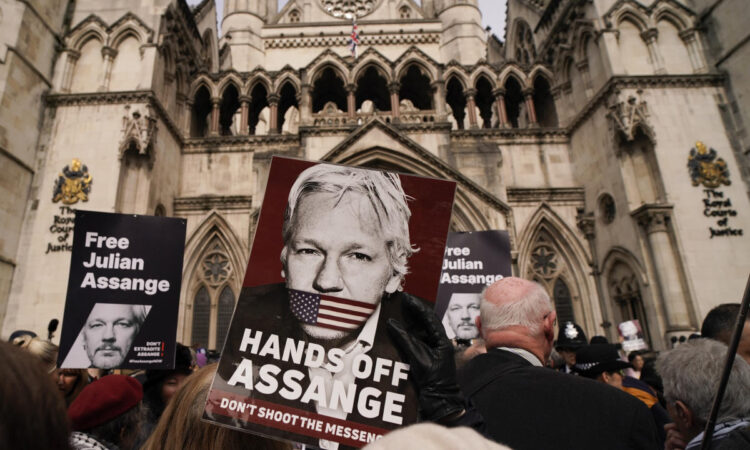UK court says Assange can’t be extradited on espionage charges until US rules out death penalty

LONDON (AP) — A British court ruled Tuesday that Julian Assange can’t be extradited to the United States on espionage charges unless U.S. authorities guarantee he won’t get the death penalty, giving the WikiLeaks founder a partial victory in his long legal battle over the site’s publication of classified American documents.
Two High Court judges said they would grant Assange a new appeal unless U.S. authorities give further assurances within three weeks about what will happen to him. The ruling means the legal saga, which has dragged on for more than a decade, will continue — and Assange will remain inside London’s high-security Belmarsh Prison, where he has spent the last five years.
Judges Victoria Sharp and Jeremy Johnson said the U.S. must guarantee that Assange, who is Australian, “is afforded the same First Amendment protections as a United States citizen, and that the death penalty is not imposed.”
The judges said that if the U.S. files new assurances, “we will give the parties an opportunity to make further submissions before we make a final decision on the application for leave to appeal.” The judges said a hearing will be held May 20 if the U.S. makes those submissions.
The U.S. Justice Department declined to comment Tuesday.
Assange’s supporters say he is a journalist protected by the First Amendment who exposed U.S. military wrongdoing in Iraq and Afghanistan that was in the public interest.
Assange’s wife Stella Assange said the WikiLeaks founder “is being persecuted because he exposed the true cost of war in human lives.”
“The Biden administration should not issue assurances. They should drop this shameful case, which should never have been brought,” she said outside the High Court in London.
The ruling follows a two-day hearing in the High Court in February, where Assange’s lawyer Edward Fitzgerald said American authorities were seeking to punish him for WikiLeaks’ “exposure of criminality on the part of the U.S. government on an unprecedented scale,” including torture and killings.
The U.S. government said Assange’s actions went beyond journalism by soliciting, stealing and indiscriminately publishing classified government documents that endangered many people, including Iraqis and Afghans who had helped U.S. forces.
The judges rejected six of Assange’s nine grounds of appeal, including the allegation that his prosecution is political. They said that while Assange “acted out of political conviction … it does not follow however that the request for his extradition is made on account of his political views.”
The judges also said Assange could not appeal based on allegations, made by his lawyers, that the CIA developed plans to kidnap or kill Assange during the years he spent holed up in the Ecuadorian Embassy in London, to prevent him from trying to flee.
The judges said “plainly, these are allegations of the utmost seriousness,” but concluded they had no bearing on the extradition request.
“Extradition would result in him being lawfully in the custody of the United States authorities, and the reasons (if they can be called that) for rendition or kidnap or assassination then fall away,” the ruling said.
They accepted three grounds or appeal: the threat to Assange’s freedom of speech, Assange’s claim that he faces disadvantage because he is not a U.S. citizen, and the risk he could receive the death penalty.
U.S. authorities have promised Assange would not receive capital punishment, but the judges said that “nothing in the existing assurance explicitly prevents the imposition of the death penalty.”
Jennifer Robinson, one of Assange’s lawyers, said that “even if we receive the assurances, we’re not confident we can rely on them.”
Assange, 52, a computer expert, has been indicted in the U.S. on charges over Wikileaks’ publication in 2010 of hundreds of thousands of classified documents.
U.S. prosecutors say he conspired with U.S. army intelligence analyst Chelsea Manning to hack into a Pentagon computer and release secret diplomatic cables and military files on the wars in Iraq and Afghanistan.
Assange faces 17 counts under the Espionage Act and one charge of computer misuse. If convicted, his lawyers say he could receive a prison term of up to 175 years, though American authorities have said any sentence is likely to be much lower.
Assange’s wife and supporters say his physical and mental health have suffered during more than a decade of legal battles and confinement.
“My concerns about the precarious mental health of Julian Assange and his unfitness to be extradited, as well as the potential for him to receive a wholly disproportionate sentence in the United States, have not been assuaged by the court,” said Alice Jill Edwards, the United Nations’ special rapporteur on torture, an independent expert for the world body.
Assange’s legal troubles began in 2010, when he was arrested in London at the request of Sweden, which wanted to question him about allegations of rape and sexual assault made by two women. In 2012, Assange jumped bail and sought refuge inside the Ecuadorian Embassy.
The relationship between Assange and his hosts eventually soured, and he was evicted from the embassy in April 2019. British police immediately arrested and imprisoned him for breaching bail in 2012. Sweden dropped the sex crimes investigations in November 2019 because so much time had elapsed.
A U.K. district court judge rejected the U.S. extradition request in 2021 on the grounds that Assange was likely to kill himself if held under harsh U.S. prison conditions. Higher courts overturned that decision after getting assurances from the U.S. about his treatment. The British government signed an extradition order in June 2022.
___
Associated Press writers Brian Melley in London and Eric Tucker in Washington contributed to this report.






